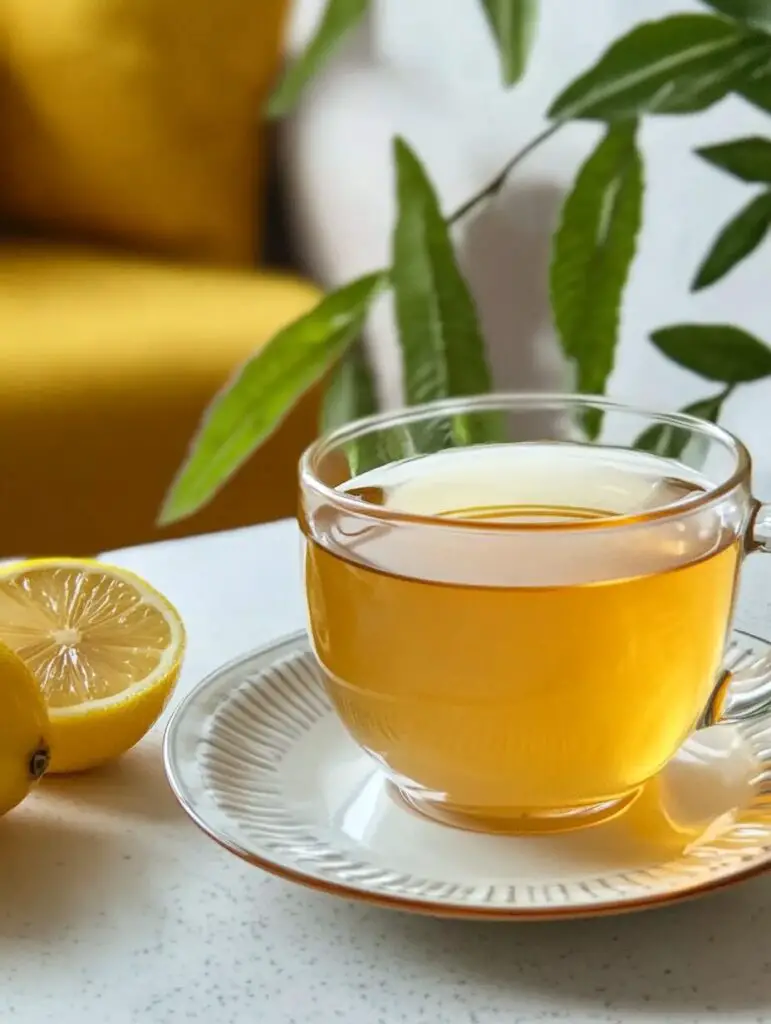When life gets busy or overwhelming, few things are more calming than a warm cup of herbal tea. And among the many herbal options out there, Lemon Verbena Tea stands out as a fragrant, refreshing, and medicinally potent choice. This delightful tea has been cherished for centuries not just for its citrusy aroma and bright flavor, but also for its soothing effects on digestion, stress, and sleep. If you’ve never tried it or are looking for new ways to enjoy it, you’re in the right place. This comprehensive guide to lemon verbena tea will explore everything from its history and health benefits to brewing techniques, creative variations, and must-know tips.
Whether you’re a tea lover or a wellness enthusiast, get ready to learn why this underappreciated herb deserves a spot in your daily ritual.
What Is Lemon Verbena?
Lemon verbena, scientifically known as Aloysia citrodora, is a perennial shrub native to South America. Its long, slender leaves emit a strong lemon fragrance when crushed, making it popular in both culinary and medicinal uses. The leaves can be used fresh or dried, but in both forms, they retain their signature citrusy scent and flavor.
In herbal medicine, lemon verbena has been valued for its calming and digestive properties. Unlike some herbal teas that are bitter or overly earthy, lemon verbena tea offers a naturally smooth, slightly sweet flavor that appeals to a wide range of palates.
The History of Lemon Verbena Tea
Lemon verbena has a rich history that dates back centuries. It was brought to Europe by Spanish explorers in the 17th century, where it quickly gained popularity among herbalists and tea lovers. Over time, it became a household staple in many parts of the world, particularly in France, where it’s called “verveine citronnelle.”
From royal gardens to rural kitchens, lemon verbena tea became beloved for its delicate aroma, healing properties, and versatility. Today, it’s making a comeback as more people turn to natural remedies and simple, wholesome wellness rituals.
Health Benefits of Lemon Verbena Tea
What makes lemon verbena tea more than just a pleasant drink? Plenty! This herbal infusion packs a powerful punch of wellness benefits:
- Soothes Digestion: Traditionally used to relieve bloating, gas, and indigestion.
- Relieves Stress: Its calming effects can help ease anxiety and promote relaxation.
- Supports Sleep: Sipping lemon verbena tea before bed may improve sleep quality.
- Anti-inflammatory: Contains compounds that reduce inflammation in the body.
- Rich in Antioxidants: Fights free radicals and supports overall health.
- Weight Management: May support metabolism and curb appetite.

How to Brew the Perfect Cup of Lemon Verbena Tea
Brewing lemon verbena tea is incredibly simple, whether you’re using fresh or dried leaves.
Ingredients:
- 1 tablespoon dried lemon verbena or 3–4 fresh leaves
- 1.5 to 2 cups boiling water
- Optional: honey, lemon slices, ginger, or mint for flavor
Instructions:
- Place the leaves in a teapot or mug.
- Pour boiling water over the leaves.
- Cover and steep for 5–7 minutes.
- Strain, sweeten if desired, and enjoy.
For a stronger flavor, steep longer or use more leaves. You can also cold-brew it for a refreshing iced tea.
Variations and Blends
Lemon verbena pairs well with other herbs, spices, and teas. Try these popular combinations:
- Lemon Verbena + Mint: Extra refreshing, great for digestion.
- Lemon Verbena + Chamomile: A bedtime classic.
- Lemon Verbena + Ginger: Warming and invigorating.
- Lemon Verbena + Green Tea: A citrusy twist on traditional green tea.
Culinary Uses of Lemon Verbena
Beyond tea, lemon verbena can be used in the kitchen in many delicious ways:
- Infused into syrups for desserts
- Mixed into fruit salads or dressings
- Steeped in milk or cream for custards and ice creams
- Chopped and added to baked goods or scones
These uses not only enhance flavor but also deliver the same health benefits in different forms.
Growing Your Own Lemon Verbena
If you love lemon verbena tea, consider growing your own plant. It’s easy to care for and thrives in warm, sunny climates.
- Soil: Well-drained, slightly acidic
- Light: Full sun (at least 6 hours)
- Watering: Regular but not soggy
- Harvesting: Pick leaves often to encourage growth. Use fresh or dry for later use.
Storing and Preserving Lemon Verbena
To enjoy lemon verbena year-round:
- Drying: Hang bunches upside down in a dry, dark place. Store in an airtight jar.
- Freezing: Chop and freeze in ice cube trays with water or oil.
- Infusing: Make lemon verbena tinctures or oils for culinary or wellness use.
When to Drink Lemon Verbena Tea
Because of its calming and digestive properties, lemon verbena tea is especially beneficial:
- After meals, to aid digestion
- In the evening, to relax and prepare for sleep
- During stressful days, as a natural calming ritual
- Cold, in summer months, as a refreshing and healthy iced tea
Who Should Avoid Lemon Verbena Tea?
While lemon verbena tea is safe for most people, a few precautions:
- Pregnant or breastfeeding individuals should consult a doctor first.
- People with kidney issues should avoid large amounts due to potential irritation.
- Always source from reputable suppliers to ensure purity and safety.
Lemon Verbena Tea FAQs
Q: Can I drink lemon verbena tea every day?
A: Yes, in moderation. One to two cups daily is generally safe and beneficial.
Q: What does lemon verbena tea taste like?
A: It’s light, citrusy, slightly sweet, and not bitter at all.
Q: Can I mix lemon verbena with other teas?
A: Absolutely. It pairs well with green tea, black tea, chamomile, and mint.
Q: Is lemon verbena tea caffeine-free?
A: Yes, it’s naturally caffeine-free.
Q: Can I give lemon verbena tea to children?
A: Yes, in small amounts. It’s gentle and often used to soothe upset stomachs.
Conclusion: Why Lemon Verbena Tea Deserves a Spot in Your Wellness Routine
In a world full of trendy superfoods and flashy health products, lemon verbena tea stands out as a humble yet powerful herbal ally. With its soothing citrus flavor, calming properties, and range of health benefits, it’s more than just a delicious drink—it’s a wellness ritual in a cup. Whether you’re sipping it for better sleep, smoother digestion, or simply a moment of calm, this ancient brew fits beautifully into any modern lifestyle.
So the next time you need a gentle lift or a relaxing pause, brew a cup of lemon verbena tea—your body and mind will thank you.
Print
Lemon Verbena Tea: A Soothing Herbal Brew Packed with Flavor and Health Benefits
- Total Time: 7 minutes
- Yield: 1–2 cups
Description
Discover the calming benefits, brewing methods, and wellness uses of lemon verbena tea in this complete guide to the citrusy herbal favorite.
Ingredients
1 tablespoon dried lemon verbena leaves (or 3–4 fresh leaves)
1.5 to 2 cups water
Optional: honey, lemon slices, mint leaves, or ginger for extra flavor
Instructions
-
Boil the Water:
Bring the water to a gentle boil in a small saucepan or kettle. -
Prepare the Tea Leaves:
Place the lemon verbena leaves (dried or fresh) into a teapot, infuser, or mug. -
Steep:
Pour the hot water over the leaves. Cover and let steep for 5–7 minutes for maximum flavor and benefits.
-
Strain and Serve:
Strain the tea into a mug. Add honey, lemon, or mint if desired. Enjoy warm and aromatic!
Notes
-
For a stronger brew, steep the leaves longer or add more lemon verbena.
-
Fresh leaves offer a brighter, citrusier flavor; dried ones are more mellow and earthy.
-
Chill it for a refreshing iced version—just let it cool, pour over ice, and garnish with lemon slices.
-
Combine with chamomile or lavender for a relaxing bedtime blend.
- Prep Time: 2 minutes
- Cook Time: 5minutes


